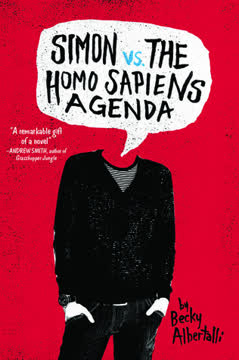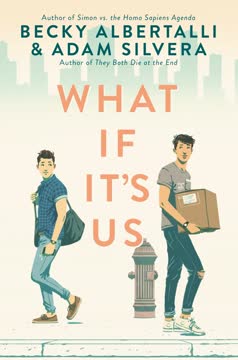Plot Summary
Arrival at Blackwell
Imogen Scott arrives at Blackwell College to visit her best friend Lili. Despite being invited numerous times, this is her first visit. Imogen is nervous about meeting Lili's new queer friends, feeling out of place as a straight ally. Her sister Edith and friend Gretchen drop her off, teasing her about the weekend ahead. Imogen is determined to fit in and make the most of her time on campus.
Queer Friendships Form
Imogen is introduced to Lili's close-knit group of queer friends, including Tessa, Declan, Mika, and Kayla. She quickly bonds with them, feeling a sense of belonging she didn't expect. The group is warm and welcoming, and Imogen finds herself drawn to Tessa, who is charming and easy to talk to. As the weekend progresses, Imogen begins to question her own identity.
Secrets and Lies
Lili confesses to Imogen that she told her friends they used to date, a lie meant to make Lili feel more legitimate in her queerness. Imogen is taken aback but agrees to go along with it. This revelation forces Imogen to confront her own feelings and the possibility that she might not be as straight as she thought. The lie becomes a catalyst for self-discovery.
Questioning Identity
Imogen grapples with her feelings for Tessa and the implications of Lili's lie. She reflects on past experiences and realizes she may have been ignoring signs of her own queerness. Imogen's internal struggle intensifies as she tries to reconcile her identity with the expectations of those around her. The weekend becomes a journey of self-discovery and acceptance.
Party Revelations
At a dark academia-themed party, Imogen's feelings for Tessa come to a head. The atmosphere is electric, and Imogen finds herself drawn to Tessa in a way she can't ignore. They share a dance and a kiss, marking a turning point in Imogen's understanding of herself. The night is both exhilarating and terrifying, as Imogen realizes she must confront her truth.
Confrontations and Confessions
The aftermath of the party brings tension and confrontation. Gretchen, Imogen's friend, challenges her about her sexuality, leading to a heated discussion. Imogen is forced to defend her feelings and identity, ultimately coming out as bisexual. The confrontation is painful but necessary, allowing Imogen to embrace her true self and find support in her friends.
Love and Acceptance
Imogen returns home with a newfound sense of self. She reflects on her journey and the importance of being true to herself. Imogen's relationship with Tessa deepens, and she feels accepted and loved for who she is. The experience at Blackwell has changed her, and she looks forward to the future with hope and confidence, knowing she has a supportive community behind her.
Characters
Imogen Scott
Imogen is a high school senior who visits her best friend Lili at college. Initially identifying as a straight ally, she begins to question her sexuality after meeting Lili's queer friends. Imogen's journey is one of self-exploration, as she navigates her feelings for Tessa and confronts her own identity. Her character evolves from uncertainty to acceptance, embracing her bisexuality.
Lili Cardoso
Lili is Imogen's best friend and a college student at Blackwell. She is openly queer and has found a supportive community at college. Lili's lie about dating Imogen stems from her own insecurities, but she ultimately supports Imogen's journey of self-discovery. Lili is a grounding presence, offering love and acceptance to Imogen as she navigates her identity.
Tessa Minsky
Tessa is one of Lili's college friends and quickly becomes a significant figure in Imogen's life. She is openly queer and exudes confidence and warmth. Tessa's easygoing nature and genuine interest in Imogen help Imogen feel comfortable exploring her feelings. Tessa represents the possibility of love and acceptance, encouraging Imogen to embrace her true self.
Gretchen Patterson
Gretchen is Imogen's friend from high school, known for her strong opinions and protective nature. She challenges Imogen about her sexuality, leading to a confrontation that forces Imogen to defend her identity. Gretchen's intentions are rooted in her own experiences and fears, but her approach is often abrasive. Her character highlights the complexities of navigating friendships and identity.
Edith Scott
Edith is Imogen's younger sister, who is openly queer and confident in her identity. She provides a safe space for Imogen to express her fears and insecurities. Edith's unwavering support and understanding help Imogen feel less alone in her journey. Her character represents the importance of family and unconditional love in the process of self-discovery.
Declan
Declan is one of Lili's college friends, known for his charm and playful nature. He is part of the close-knit group that welcomes Imogen into their circle. Declan's easygoing demeanor and humor provide a sense of comfort and belonging for Imogen as she navigates her new environment.
Mika
Mika is a nonbinary member of Lili's friend group, known for their artistic talents and introspective nature. They offer a unique perspective on identity and self-expression, encouraging Imogen to explore her own feelings. Mika's presence in the group highlights the diversity and inclusivity of Lili's college community.
Kayla
Kayla is another member of Lili's friend group, known for her confidence and bold personality. She is supportive and encouraging, helping Imogen feel welcome and accepted. Kayla's character adds to the vibrant and dynamic energy of the group, creating a space where Imogen can explore her identity without judgment.
Plot Devices
Self-Discovery
The central plot device in the story is Imogen's journey of self-discovery. Her visit to Blackwell College serves as a catalyst for exploring her sexuality and identity. Through interactions with Lili's friends and her growing feelings for Tessa, Imogen confronts her assumptions about herself and embraces her bisexuality. This journey is marked by moments of introspection, confrontation, and acceptance.
Queer Community
The queer community at Blackwell College plays a significant role in Imogen's journey. Lili's group of friends provides a supportive and accepting environment where Imogen can explore her feelings without fear of judgment. The community's diversity and inclusivity highlight the importance of finding a space where one can be true to themselves.
Confrontation
Confrontation is a key plot device that forces Imogen to defend her identity and confront her fears. The confrontation with Gretchen at the diner serves as a turning point, pushing Imogen to come out as bisexual and embrace her true self. This moment of conflict is necessary for Imogen's growth and self-acceptance.
Analysis
"Imogen, Obviously" is a story about self-discovery, identity, and acceptance. Through Imogen's journey, the book explores the complexities of questioning one's sexuality and the importance of finding a supportive community. The story challenges assumptions about identity and highlights the fluidity of attraction. It emphasizes the need for self-acceptance and the courage to embrace one's true self, even in the face of doubt and fear. The book also addresses the nuances of friendship and the impact of external perceptions on personal identity. Ultimately, "Imogen, Obviously" is a celebration of love, acceptance, and the journey to self-discovery.
Last updated:
FAQ
Synopsis & Basic Details
What is Imogen, Obviously about?
- A Queer Coming-of-Age: Imogen, Obviously follows high school senior Imogen Scott, a self-proclaimed straight ally, as she visits her best friend Lili at Blackwell College. What begins as a casual weekend trip quickly unravels into a profound journey of self-discovery, challenging Imogen's long-held assumptions about her own sexuality and identity.
- Navigating Friendship & Lies: Imogen finds herself entangled in a white lie Lili told her college friends—that Imogen is her bisexual ex-girlfriend. This fabricated backstory, initially a source of discomfort, becomes an unexpected catalyst for Imogen to confront her burgeoning feelings for one of Lili's charming queer friends, Tessa.
- Embracing Authentic Self: The novel explores the complexities of queer identity, imposter syndrome, and the nuances of friendship, culminating in Imogen's emotional realization and acceptance of her bisexuality. It's a story about finding your place, even when you thought you already knew exactly who you were.
Why should I read Imogen, Obviously?
- Relatable Self-Discovery: Readers will connect with Imogen's internal monologue, a deeply honest and often humorous portrayal of questioning one's identity later in life. The book offers a fresh perspective on coming out, emphasizing that there's no single timeline or "right" way to discover your sexuality, making it a powerful read for anyone exploring their own path.
- Rich Character Dynamics: Beyond Imogen's personal journey, the novel excels in its portrayal of complex friendships, particularly the evolving relationship between Imogen and Lili, and the challenging but ultimately growth-inducing dynamic with Gretchen. The vibrant queer community at Blackwell provides a warm, authentic backdrop for these explorations.
- Humor & Heart: Becky Albertalli masterfully blends laugh-out-loud moments (like the "tiny German sausage" prank or the "Lesbian Elsa" story) with profound emotional depth. The narrative is infused with wit, pop culture references, and genuine warmth, making it an engaging and ultimately uplifting experience.
What is the background of Imogen, Obviously?
- Contemporary YA Setting: The story is set in the present day, primarily across a single weekend at Blackwell College in upstate New York, contrasting with Imogen's small hometown of Penn Yan. This geographical shift highlights the cultural differences and the liberating atmosphere of a college campus, a common theme in young adult fiction.
- Exploration of Queer Discourse: The novel delves into contemporary discussions within the queer community, including debates around "baby queers," "straight-passing" individuals, queerbaiting, and the concept of "safe spaces." These discussions, often contentious, are woven into the narrative through character interactions, particularly with Gretchen, reflecting real-world complexities.
- Intertextual & Pop Culture Richness: Albertalli peppers the narrative with numerous pop culture allusions, from classic films like But I'm a Cheerleader and The Princess Bride to modern TikTok trends and musical artists like Clairo and MUNA. These references ground the story in a recognizable cultural landscape and often serve as subtle thematic touchstones for Imogen's journey of self-discovery.
What are the most memorable quotes in Imogen, Obviously?
- "I'm the kind of person who has a favorite adverb (obviously, obviously).": This early quote, found in Chapter 1, perfectly encapsulates Imogen's initial character: her meticulous nature, her desire for certainty, and the ironic foreshadowing of her own internal confusion. It highlights the central theme of Imogen, Obviously – that what seems "obvious" on the surface can hide deeper truths.
- "Comphet's a bitch.": Uttered by Tessa in Chapter 52, this concise and powerful statement cuts through Imogen's self-doubt and internalized biphobia. It's a pivotal moment of validation, acknowledging the societal pressure of compulsory heterosexuality that often prevents individuals from recognizing their own queer attractions, a key Imogen, Obviously theme.
- "I've never existed in the same space as someone like that. It's so different from what I expected. Kissing's so different from the inside. And I don't think I really thought about what happens after—": From Chapter 60, this quote beautifully articulates Imogen's profound shift after her first real kiss with Tessa. It captures the transformative power of intimacy and self-acceptance, moving beyond the theoretical to the deeply personal, revealing the core of Imogen Scott's emotional journey.
What writing style, narrative choices, and literary techniques does Becky Albertalli use?
- First-Person, Stream-of-Consciousness: Albertalli employs a deeply immersive first-person narrative, allowing readers direct access to Imogen's "hamster-wheel brain." This style, rich with internal monologues, self-corrections, and anxious asides, perfectly captures the protagonist's overthinking nature and her journey of self-discovery in Imogen, Obviously*.
- Dialogue-Driven & Text Message Integration: The novel heavily relies on authentic, fast-paced dialogue, often peppered with contemporary slang and pop culture references. The seamless integration of text message exchanges, complete with emojis and typing indicators, not only propels the plot but also offers intimate glimpses into character relationships and unspoken feelings, enhancing the Imogen, Obviously character analysis.
- Humor, Irony, and Metaphor: Albertalli's writing is characterized by a blend of witty humor and subtle irony, particularly in Imogen's self-deprecating observations. She frequently uses vivid metaphors (e.g., "human sailboat," "pinball machine heart") to articulate complex emotional states, making Imogen's internal struggles relatable and engaging for readers exploring themes in Imogen, Obviously.
Hidden Details & Subtle Connections
What are some minor details that add significant meaning?
- The "Obviously" Adverb: Imogen's self-proclaimed favorite adverb, "obviously," appears frequently throughout the narrative, often ironically. This seemingly minor detail subtly highlights her deep-seated need for certainty and clear rules, which is constantly challenged as she navigates the ambiguities of her sexuality and the complexities of human connection, a key aspect of Imogen Scott's motivations.
- Lili's Dorm Room Decor: The specific photos above Lili's bed—Niagara Falls, Check, Please! cover, "Bem-vindo a São Paulo," and childhood pictures with Imogen—are more than just clutter. They symbolize Lili's journey from her small-town past to her queer college present, and her enduring connection to home, even as she embraces a new identity. The inclusion of the Check, Please! cover, a popular queer webcomic, subtly reinforces the authentic queer space Lili has cultivated.
- Imogen's "Resting Bunny Face": Imogen's self-conscious description of her "wide-eyed, soft, forever on high alert" expression, especially when meeting new people, is a recurring detail. This "bunny mode" is a physical manifestation of her social anxiety and people-pleasing tendencies, which directly impact her ability to articulate her true feelings and navigate her Imogen, Obviously queer identity.
What are some subtle foreshadowing and callbacks?
- Solomon Asch Experiment: Gretchen's anecdote about the Solomon Asch conformity experiment in Chapter 5 subtly foreshadows Imogen's later struggle with her own perceptions versus external validation. Imogen's initial certainty about "The Taming of the Shrew" being the correct answer, only to doubt herself when Kayla suggests "Much Ado About Nothing," mirrors her broader internal conflict about her sexuality, a key element of Imogen, Obviously analysis.
- Tessa's "Flirty-Pants" Reputation: Lili's casual comment in Chapter 7 that Tessa "does that" when Imogen asks if Tessa is flirting, initially dismisses Imogen's burgeoning feelings. This subtly foreshadows Imogen's later confusion about Tessa's genuine interest, highlighting the difficulty of discerning true attraction from a "flirty personality," a common theme in Tessa Minsky character analysis.
- The "Lesbian Elsa" Lie: Imogen's spontaneous lie about being "Lesbian Elsa" for Halloween at age seven (Chapter 19), which she later admits was Edith's story, is a powerful callback to Lili's initial lie about their past relationship. This parallel underscores Imogen's tendency to adopt convenient queer "backstories" to fit in, setting the stage for her eventual, authentic coming out as bisexual in Imogen, Obviously.
What are some unexpected character connections?
- Imogen's Dad and Shyness: A subtle connection is drawn between Imogen and her dad, who is also described as shy and prone to "disappearing to the basement." Her mom's story about him pretending to be a film buff to avoid talking (Chapter 2) reveals a shared trait of social anxiety and people-pleasing, offering a deeper understanding of Imogen Scott's motivations beyond her immediate queer journey.
- Gretchen and Mama P's Shared Traits: Mama P, Gretchen's mom, is shown to have a "conspiratorial way" of smiling, similar to Gretchen (Chapter 30). This subtle detail hints at the underlying bond and shared personality quirks between them, despite Gretchen's occasional frustration with her mom, adding a layer to Gretchen Patterson's character.
- Tessa's Family Parallels: Tessa's description of her siblings, Dan and Rachael, being "almost exactly two years apart" and having "June birthdays" (Chapter 11) mirrors Imogen and Edith's own close-knit, two-year age gap and shared Halloween birthday. This unexpected parallel subtly connects their family dynamics and highlights a potential compatibility between Imogen and Tessa, enriching Tessa Minsky character analysis.
Who are the most significant supporting characters?
- Edith Scott: The Unwavering Mirror: Imogen's younger sister, Edith, is crucial not just as a supportive "baby gay" but as a constant, authentic reflection of queer identity. Her early, unquestioning self-acceptance (e.g., "marry a girl" in preschool, "Lesbian Elsa" costume) serves as a stark contrast to Imogen's internal struggle, pushing Imogen to confront her own delayed realization. Edith's fierce defense of Imogen at the diner (Chapter 51) solidifies her role as a vital emotional anchor and a symbol of unconditional love in Imogen, Obviously.
- Gretchen Patterson: The Catalyst for Growth: While often abrasive, Gretchen
Review Summary
Imogen, Obviously is a heartfelt coming-of-age story about a girl discovering her bisexuality. Many readers found it relatable, praising the authentic representation of questioning one's sexuality and the challenges of coming out. The romance between Imogen and Tessa was widely loved. Some critics felt the book was too focused on queer discourse and stereotypes. Overall, readers appreciated the book's exploration of identity, found family, and the complexities of queer experiences, though opinions varied on its execution and pacing.
Similar Books
Download PDF
Download EPUB
.epub digital book format is ideal for reading ebooks on phones, tablets, and e-readers.
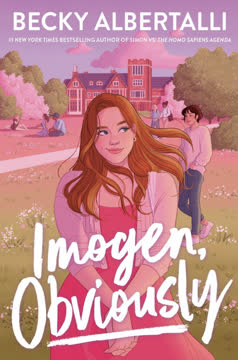
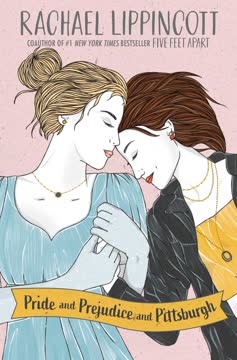
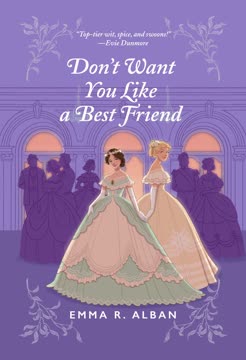
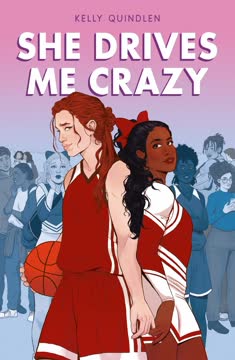
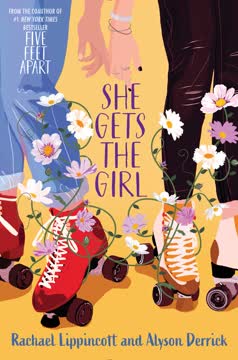
![6 Times We Almost Kissed [and One Time We Did] Summary](https://files.sobrief.com/social/cover_6-times-we-almost-kissed-and-one-time-we-did_360px_1747297013.jpg)

